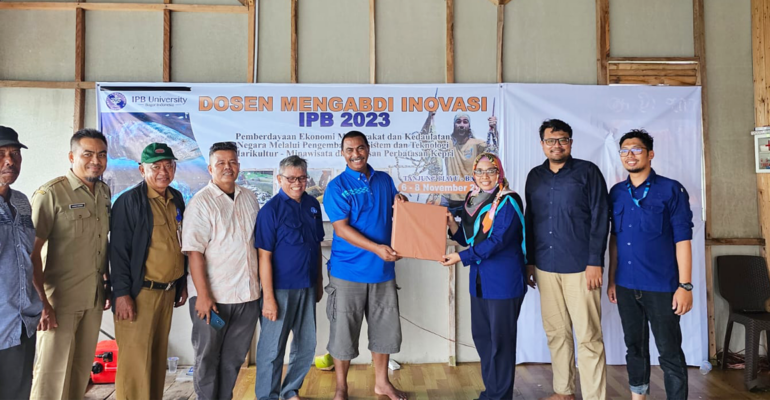Lecturer Serving Innovation, IPB University Introduces Mariculture Innovation to Pokdakan in the Riau Islands

Through the Lecturer Serving Innovation (DMI) program, a team of IPB University lecturers from the Department of Aquaculture, Faculty of Fisheries and Marine Sciences (FPIK) introduces mariculture technology innovations to the community, especially the Sioot Coral Fish Cultivator Group (Pokdakan) in Tanjung Piayu Laut, Batam City , Riau Islands Province (Kepri), 6-8/11.
Dr Dinamella Wahjuningrum, who is a woman from Tanjungpinang City, Riau Islands, along with team members Dr Irzal Effendi, Fajar Maulana MSi, and Wildan Nurussalam, MSi provided training and solution discussions regarding various cultivation methods for a number of fish commodities such as grouper, white snapper (siakap), sea cucumbers and mud crabs.
“This activity aims to help solve problems that exist in cultivation activities at the location, especially at the enlargement stage. Providing and acclimatizing seeds is faced with the problem of death after stocking and during maintenance. “Production efficiency issues are also a concern that needs to be resolved,” she said.
In her presentation, Dr Dinamella explained the use and application of herbal medicines (phytobiotics). “Apart from being a food safety application based on local raw materials, this herbal application also aims to provide organic branding and fulfill food safety aspects, so that it can be more attractive to consumers,” she said.
Herbal ingredients that have the potential to be used include onion skins, garlic, meniran, bitter, banana stem waste, and caramunting extract which can be used for mud crab reproductive activities.
Meanwhile, Dr Irzal explained the production system for mariculture cultivation businesses, one of which was related to the potential of lobster cultivation commodities that were desired by the community, considering that it was close to the export market, namely Singapore.
“It’s just that the availability of seeds needs to be prepared or arranged first. “The standard operating procedures (POS) for cultivation can be learned from successful locations,” he explained.
Wildan Nurussalam and Fajar Maulana each conveyed the environmental conditions needed for cultivation, especially in locations around the waters of Tanjung Piayu Laut. Both of them also discussed the seeding aspects that need to be considered in seeding activities for cultivated biota as well as the seed selection factors that need to be paid attention to by cultivators.
“Environmental factors that need to be considered include the physical, chemical and biological factors of waters. “All of this needs to be known from the start so that the life of cultivated biota can be supported by the quality of the waters chosen,” he explained.
Fajar Maulana further said that the seeds used for cultivation should be of good quality. This can be characterized by seeds that are certified or come from a seed house, have a uniform size to prevent cannibalism or dominance, seeds that are healthy and have no defects and are responsive when disturbed.
On this occasion, Chairman of the Coastal Community Empowerment and Extension Division, Riau Islands Fisheries Service (DP), Ir Wan Ilham, MSi expressed his support. “We really support this program, even if possible, more lecturers who have marine and fisheries knowledge from the Riau Islands will carry out this activity. “Considering that most of this province’s area is sea and small islands,” he said.
He also advised the next generation to continue to utilize Batam’s sea waters for sustainable cultivation activities. This is because the catch now is different from before, which was large in quantity, large in size and not far from land, whereas now that has changed.
Chairman of Pokdakan Sioot Coral, Kamaruddin Saban hopes that this training can improve members’ abilities in solving problems in the community’s cultivation of grouper, snapper, crab and sea cucumber.
“The role of researchers as teachers is also expected to be able to accompany novice cultivators to continue to progress and develop. “We also open wide opportunities for cooperation and accept students who want to help in our activities,” he said. (*/Rz) (IAAS/RUM)



